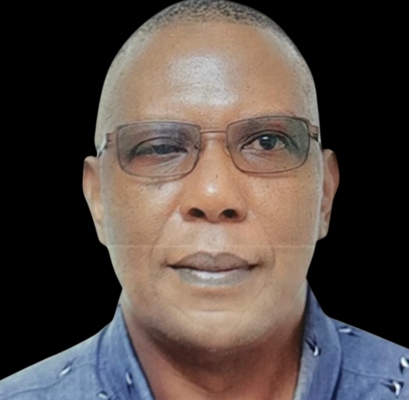LRS applies a feminist lens to just transition work by helping partners understand how gender power dynamics shape climate impacts and the realities of the world of work.
In 2024, the Labour Research Service (LRS) partnered with the Friedrich Ebert Stiftung (FES) to conduct a gender analysis for its Just Transition projects in Africa. According to John Mark Mwanika, Senior Programme Manager at the FES Trade Union Competence Centre for Sub-Saharan Africa, the partnership led to a more gender-transformative approach in the just transition programme.

John Mark Mwanika, Senior Programme Manager at the FES Trade Union Competence Centre for Sub-Saharan Africa
What gaps did FES identify in its approach to Just Transition that made a partnership with the LRS necessary?
As a social democratic institution working with trade unions and social movements, we strive to enable our partners to engage meaningfully in discussions about a just transition. We needed to understand what inclusive social dialogue truly involves. The labour force and trade unions are male-dominated spaces, and women, informal workers, and other vulnerable groups are often overlooked or excluded. If we were serious about a Just Transition that includes everyone, we needed to create gender-responsive projects.
How did LRS influence your approach?
Partnering with LRS helped FES move from gender awareness to gender transformation. LRS designed and facilitated three virtual workshops on gender analysis for our Just Transition in Africa: Shaping Green Industrial Policy through Social Dialogue programme. These culminated in an in-person meeting in Senegal in November, where we brought together three key partner groups, trade unions, environmental organisations, and feminist groups. These groups had rarely, if ever, shared a space for joint reflection and planning. The meeting offered participants a deeper understanding of each other’s concerns and a renewed commitment to collaborate.
One LRS exercise, the gender continuum, made a huge impression. It helped reveal where we stood in terms of gender integration. Many realised they were operating from a gender-blind place and, at times, even perpetuating gender discrimination. People are thinking about what it means to be gender-transformative in programming. There is a demand for a toolkit to guide us in embedding gender responsiveness across our activities.
What is exciting is that the challenge became an opportunity. Rather than simply implementing a project, we are encouraged to think more critically and expansively. We are bringing together three key concepts, just transition, social dialogue, and gender, and this intersection has opened up space for innovation and transformative thinking.
We are building alliances with like-minded organisations. We are empowering ourselves and our partners to identify the types of groups we need to work with and establish alliances based on shared visions.
Essential resource: LRS Facilitation Toolkit – A collection of exercises for exploring power dynamics and intersecting systemic inequalities.
What makes an inclusive just transition project?
We believe in genuine participatory engagement. Once we reframed our programme as Just Transition through Social Dialogue, we brought our partners together to unpack key questions: What is a Just Transition? What are its core principles? What does social dialogue mean in practice?
Traditionally, social dialogue is seen as a tripartite model comprising government, employers, and workers. But is that sufficient for the kind of transformation we’re aiming for? We are defining a broader vision of social dialogue that prioritises the voices of women and marginalised groups in Just Transition processes. A meaningful Just Transition must treat all people equally, placing their needs at the centre, not just environmental or economic targets.
Our partners work to balance project requirements with the need for transformative and sustainable change. This approach requires unconventional thinking. Energy is prioritised in just transition agendas, while agriculture employs many more people, particularly women. We need to ask: Who sets the agenda, and who benefits from it?
Neglecting key sectors and affected communities can result in an unfair transition. Trade unions must reevaluate their commitment to democracy and inclusion, especially in supporting women, young workers, and informal workers. Unions have a unique social agency to represent those without a voice, but to do so effectively, they must confront the systems that have led us here. It requires knowledge, capacity, and advocacy, and LRS plays a vital role here.
How should trade unions evolve to support the inclusion and empowerment of informal workers in the just transition?
Informal workers, who lack social protections and work in precarious environments, are among the most vulnerable yet least represented in climate and labour policy discussions. We must engage meaningfully with informal workers and not speak about climate change or just transition in vague terms. Unions draw interest when they align with broader social movements. We need to enter communities with purpose and humility and engage across the spectrum of actors, from environmentalists and human rights defenders to technical experts.
There is a persistent myth that informal workers are hard to organise. The real issue is that unions often fail to engage them effectively. We need strategies that resonate with all workers. Informal workers want to know: What’s in it for us? If unions approach them solely to collect dues, they are seen as another actor seeking to extract value.
When I joined the Amalgamated Transport and General Workers’ Union in Uganda (ATGWU) in 2006, it had just 2,000 members. It was a male-dominated and change-resistant space. We approached informal workers’ associations instead of using the traditional model of signing up, check-offs, and collective bargaining. Each association, representing thousands, is affiliated with the union on its terms. We discussed what dues were reasonable based on their actual earnings. In the end, small contributions from many people totalled more than some formal sector unions receive. These workers self-organised, managed dues collection, and reinvested in the union. By 2018, ATGWU had grown significantly. Unions must innovate. We must document and share our experiences in the informal economy.
What is your vision for a just transition?
FES creates inclusive spaces where our partners can define for themselves what a just transition means. We believe in a participatory process grounded in local realities. Fairness must be defined by those most affected and often left out. These definitions will vary depending on the context, place, sector, and social experience. Our role is to support those voices and to ensure that just transition becomes an inclusive and collective journey.
RELATED RESOURCES
A feminist perspective on just transition







